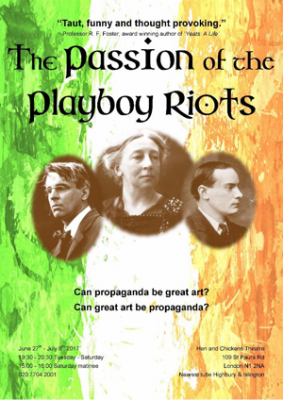Play: The Passion of the Playboy Riots

Neil Weatherall’s play The Passion of the Playboy Riots is a compelling dramatic engagement with the cultural politics of the Abbey Theatre as envisioned by WB Yeats and Lady Gregory.
Weatherall takes his audience through three key moments: the staging of Cathleen ni Houlihan; and the riots greeting The Playboy of the Western World and The Plough and the Stars.
His inspired conceit is to have Yeats and Gregory, ensconced in the wings, encounter Padraig Pearse at performances of all three plays.
In ‘The Man and the Echo’, Yeats asks himself: ‘Did that play of mine send out/Certain men the English shot?’ And we certainly see Pearse’s zeal increase following his witnessing of ni Houlihan’s call to sacrifice for the nation.
In the second encounter, Pearse is cast as the pious nationalist prig who leads the rowdy reaction to Synge’s acute Molière-like satire on a priest-ridden, patriarchal and hypocritical country where people are longing to cast off the shackles, of the imagination not least.
(Gregory famously sent Yeats a telegram: ‘Play broke up on the word shift.’ Yeats’s father addressed those demonstrating and spoke of ‘this land of saints’, only to toss his handsome head back mischievously, and add, ‘of plaster saints’.) Pearse darkly intimates that the days of co-founder Edward Martyn’s relations with the Abbey are numbered.
Yeats evidently felt conflicted about the schoolmaster Pearse ‘who rode our wingèd horse’, from whose theatrical rite of sacrifice during Easter Week 1916 ‘a terrible beauty [was] born’. Note the paradox in that phrase. He starts in fright when he encounters the actor Padraig who is playing the role of the Orator, who intones Padraig Pearse’s lines in O’Casey’s great play about the Rising, for he takes him for Pearse’s ghost (the same actor plays both parts).
A decade on from the event, nationalist myth-makers had no appetite to see the bitter, bloody and farcical tragedy that was The Plough and the Stars. Yeats took to the stage to lecture the rioters: ‘You have disgraced yourselves again.’ O’Casey had the Orator’s shadow extend in Expressionist magnitude over the windows of the Pub in a manner reminiscent of the vampire ascending the stairs in Nosferatu. This was to emphasise the chilling call to blood sacrifice (cast as a Eucharistic Passion in Pearse’s fundamentalist vision). O’Casey himself had no truck with violence which was why he did not participate in the Rising and the effects of it are all too clear in his great play. As the Orator spouts his blood oration, Dublin’s denizens squabble, flirt, fight and drink, living their inglorious lives.
This was a fascinating piece of theatre with some lovely moments of wit and humour. More passion and darker strains should be allowed to come to the fore.
It would also be good to ensure we are aware that Lady Gregory (for all Yeats’s claim in ‘The Man and the Echo’) co-wrote Cathleen ni Houlihan; and to draw attention to the role her husband, an arch-colonial administrator, played in drawing up draconian legislation during the Famine, not least as Yeats and Gregory lecture Pearse about this appalling moment in Irish history.
Fundamentally, the founders of the Abbey had to fend off attempts by nationalists and members of the Gaelic League to appropriate the theatre for their own propagandizing purposes. But it is also crucial to appreciate that Yeats, Gregory and Synge were all part of the socially exalted Anglo-Irish ascendancy, whose very class elitism could make their adherence to the nationalist cause appear questionable. Gregory’s nephew was dragooned in to bring a claque of Trinity College hearties to support Playboy. They did so by braying out ‘God save the King’.
I see this play as fascinating and rich in potential. Cath Humphrys was an urbane Lady Gregory and Justin McKenna suitably pious and hectoring as the ever-sublimating Pearse. It would benefit from surer direction and I think a further enriching in its diversity of tone and implications.
The Passion of the Playboy Riots runs at the Hen & Chickens Theatre in Islington, north London until 7 July. For more information and bookings, see: www.unrestrictedview.co.uk/the-irish-play/
Dr Philip Crispin in Lecturer in Drama at the University of Hull















